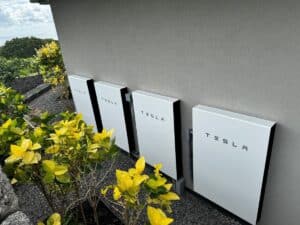In recent years, extreme weather, wildfires, and an aging power grid have made power outages an increasingly common concern across the United States. Whether you’re in California facing rolling blackouts or in Texas dealing with ice storms and grid failures, backup power is no longer just a convenience — it’s quickly becoming a necessity.
That leaves many homeowners asking a key question: Should I invest in a generator or a home battery?
While both options can keep your home powered during an outage, they function quite differently — and each has its strengths and limitations. In this blog, we’ll take a closer look at how home batteries compare to traditional fuel-powered generators, and which option might be the best fit for your needs in 2025.
How They Work
 Generators are fuel-powered machines — typically using gasoline, propane, or natural gas — that generate electricity when needed. When the grid goes down, they turn on (either manually or automatically) and supply power to parts or all of your home.
Generators are fuel-powered machines — typically using gasoline, propane, or natural gas — that generate electricity when needed. When the grid goes down, they turn on (either manually or automatically) and supply power to parts or all of your home.
Home batteries, on the other hand, store energy that’s already been collected — either from solar panels or directly from the grid. During an outage, the battery discharges its stored energy to keep your essential appliances running. Some homeowners use batteries daily, even when the power is on, to reduce energy bills by storing off-peak electricity and using it during high-rate periods.
Noise, Fuel, and Maintenance
Generators can be noisy, often operating at 65–100 decibels — comparable to a lawn mower. They also require routine maintenance such as oil changes, filter replacements, and regular fuel management. During long blackouts, having enough fuel on hand can be a challenge, especially if gas stations are closed or propane delivery is delayed.
Home batteries, by contrast, are completely silent and require almost no maintenance. There’s no fuel to refill, no engine to service, and no noise to worry about. Once installed, they charge and discharge automatically — and many models can be monitored and controlled via smartphone apps. If paired with solar panels, they can also recharge during daylight hours, extending your backup coverage.
Backup Capacity and Duration
Generators — especially whole-home standby models — can power an entire house, including heavy loads like air conditioning, ovens, or electric heating, as long as fuel is available.
Batteries are more flexible and modular. Most standard home batteries offer 5 to 20 kWh of capacity per unit, which is ideal for powering essentials like refrigeration, lighting, Wi-Fi, and device charging during shorter outages. But that doesn’t mean you’re limited. Many battery systems — such as those from Marstek or Tesla — are easily expandable, allowing you to scale up to 40 or even 50 kWh or more. That’s enough to power large sections of your home for multiple days, without needing fuel or making noise.
Do You Need Solar Panels?
No — solar panels are not required to use a home battery. While solar can help recharge your battery during the day, many systems can charge directly from the grid, especially during off-peak hours when electricity is cheaper. This makes batteries useful even for households without solar, particularly in areas with time-of-use pricing, like California or New York.
Cost Comparison
Generators generally cost less up front. A portable generator might run you $500 to $2,000, while a standby generator with automatic switchover typically costs between $5,000 and $10,000, not including installation.
Home batteries used to be a premium product — but that’s changing. While high-end systems like the Tesla Powerwall still cost $10,000 or more, more affordable options are now available. Brands like Marstek offer modular systems starting at $2,000 for 5 kWh, with no installation required if plug-in compatible. And unlike generators, batteries can save you money over time by reducing your energy bill.
Clean Energy and Emissions
Generators burn fossil fuels and emit carbon monoxide, carbon dioxide, and other pollutants. In some areas, especially in California, gas-powered generators are being restricted due to air quality concerns.
Home batteries, on the other hand, produce zero emissions. When charged with solar, they’re 100% clean. Even when charged from the grid, they help smooth your energy use and reduce peak demand on the utility network. For environmentally conscious homeowners, this makes batteries the clear winner.
Ease of Use and Automation
Modern battery systems are smart. They include mobile apps, real-time monitoring, and automatic switchover during outages. Once configured, you don’t have to do a thing.
Portable generators often require manual startup and physical extension cords — which can be inconvenient or even unsafe during storms or nighttime power failures. While automatic standby generators offer convenience, they still come with noise, fuel use, and ongoing maintenance.
| Feature | Generator | Home Battery |
|---|---|---|
| Noise | Loud | Silent |
| Fuel required | Yes | No |
| Maintenance | Regular | Minimal |
| Clean energy | No | Yes |
| Powers whole house | Yes (with fuel) | Yes (if expandable) |
| Works without solar | Yes | Yes |
| Cost over time | Fuel + maintenance | Can reduce bills |
| Useful daily | No | Yes |
If you’re looking for maximum backup duration and need to power your entire home during multi-day blackouts — and you don’t mind dealing with fuel — a generator might be your best bet.
If you want a quiet, clean, low-maintenance backup system that can also lower your energy bill year-round, a home battery offers long-term value — and peace of mind.
